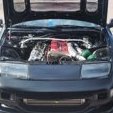Kkr 430 Potential? Will Screamer Bolt On It?
Announcements
-
Similar Content
-
Latest Posts
-
By TurboTapin · Posted
I picked up my block and head last week and have been slowly assembling it since then. Pictures I took earlier this week. The rest of the auxiliaries are on now. I just have my intake manifold runners to tap for my WMI direct port setup before putting it back on. I should hopefully have the motor back in by this weekend. -
By TurboTapin · Posted
I couldn't agree more. As an owner of a built high HP skyline, I'd be a hypocrite to not buy a Hummer for the reasons you listed though haha. -
By soviet_merlin · Posted
Is this the one? https://jpjdm.com/shop/index.php?id_product=2192&rewrite=nissan-stagea-c34-rear-boot-actuator-assembly-90550-0v000 Might be worth having a look at yahoo japan as well. Though it seems a bit odd. If the motor works itself, other than being noisy, then wouldn't it be more likely that it's an electrical issue somewhere else? And it being noisy does not seem as surprising if it has been chugging away for months -
I know this thread is quite old, but I found it, it helped me, but I also wanted to add my experience and troubleshooting finds to the chat for others. I have not been able to open the rear hatch of my 97 Stagea for several months. Figured it had just really sealed itself up over the winter and I would just get to it eventually. Well that day was yesterday. Some time ago, I noticed my battery was going flat all the time. It was frustrating. Then one quiet night in the garage, I could hear and ever so slight humming / grinding noise coming from the back of the car. It was like a really quiet popping sound or something like sand in a very low speed blender. I took off the panels in the back and noticed the noise coming from the auto close motor, so I unplugged it and the noise stopped. And the auto close was disabled. Well, fast forward to yesterday, I tried all the tricks with power and fuse and lock and unlock and I still could open the damn hatch. So I took off the panels from the inside and found the auto lock had engaged and was stuck in close position. When plugging and unplugging the fuse, I could hear the relay clicking. So I plugged the autoclose motor back in, and the damn thing let go. And immediately started making that grinding sound again. This time, instead of just unplugging the motor, I pulled the fuse, thus depowering the relay entirely. I don't have the autoclose feature now, but at least I can open the boot and not have my battery being sucked dead all the time. Not sure what caused the motor to latch when it was unplugged from the system, but I am pretty sure it won't cause any more problems now. If anyone has a lead on a new motor, please let me know. It's a cool feature that I would like to get back. Hope this helps.
-





Recommended Posts
Create an account or sign in to comment
You need to be a member in order to leave a comment
Create an account
Sign up for a new account in our community. It's easy!
Register a new accountSign in
Already have an account? Sign in here.
Sign In Now